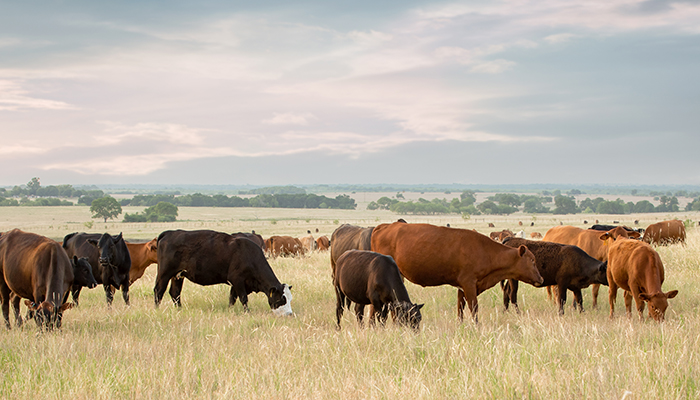Phosphorus (P) is one of the major minerals required by all animals. It is involved in many metabolic, neurological and cellular functions including bone and skeletal development, cellular energy metabolism, blood-buffering systems, activation of several B vitamins, and it is a component of genetic materials.
In beef cows, phosphorus deficiency often results in lower feed intake, poor reproductive performance, reduced milk production and reduced calf weight gain. Reduced reproductive performance is usually seen as poor conception rates resulting from delayed puberty in heifers and a delay in the return to heat following parturition in mature beef cows.
The daily Phosphorus requirement of a beef cow is determined by age, weight, body condition, stage of production and milk production (Table 1). Growing first calf heifers have a higher Phosphorus requirement than mature cows due to the demands of growth and bone development. As a cow ages (over 5-6 years), P requirement increases because the ability to absorb P decreases by as much as 50%. In addition, high-producing cows need additional P to meet the increased metabolic demands of milk production.


Phosphorus deficiencies are not uncommon in cow herds maintained on the native grass pastures and harvested forages found in Kansas and Oklahoma. The phosphorus content of native grass averages about 0.20% during the green, vegetative state, but drops to 0.10 % or below as the grass matures. This graph shows the average monthly Phosphorus content of native grass forage throughout the year compared to the Phosphorus requirement of a 1200-pound, spring calving beef cow. From this graph it is clear that forage alone cannot supply enough Phosphorus to meet the cow’s requirement during most of the year.
Feeding a complete, balanced mineral supplement that contains Calcium, Phosphorus and salt along with the other essential minerals and vitamins, is the easiest way to provide beef cows the supplemental Phosphorus needed for optimum reproductive performance.
The question often asked by producers is “How much Phosphorus do I need in my mineral?” The amount of Phosphorus needed is determined by the requirement of the cow and the quality and quantity of forage available. Dr. Cody Wright1, Extension Beef Specialist at South Dakota State University outlined the Phosphorus level needed in a free-choice mineral fed at 3.0 ounces/head/day for cows at different stages of production and fed forages of different Phosphorus content (Table 2). In most situations 6-10% phosphorus is needed. The exception is for cows grazing dormant winter range, where additional Phosphorus is needed either from a high Phosphorus mineral or from other high Phosphorus feeds such as range cubes. It was noted that a 6% Phosphorus mineral may be excessive in some early summer grazing situations, but due to variability in forage quality and mineral intake, a minimum of 6% Phosphorus is recommended. Dr. Lee McDowell2 from the University of Florida recommends that cows fed forages less with than 0.2% Phosphorus be fed minerals containing 6-8% Phosphorus or higher. Dr. Wayne Green3 at Texas A&M recommends that cows grazing unfertilized grass, should receive an 8-12% Phosphorus mineral. If the grass is fertilized, a 4-8% Phosphorus mineral is recommended. Dr. Dave Lalman4, Extension Beef Specialist at Oklahoma State recommends that beef cows on low quality forages be fed a free-choice mineral containing 8% Phosphorus.

The strategic approach to supplementing phosphorus is to feed a mineral containing at least 6% Phosphorus from 30 days prior to calving through the end of the breeding season, or when the cow’s nutrient requirements are the highest. Feeding a mineral with less than 6% Phosphorus during this critical period increases the risk that the cow’s Phosphorus requirement will not be met and poor reproductive performance may occur. Once the cow is bred, the phosphorus level in the mineral can be reduced. Since phosphorus is a relatively expensive mineral, varying the phosphorus level during different times of the year is one means of saving money.
Remember that Phosphorus is only one component of a quality, well balanced mineral supplement for beef cows. Additional major minerals including Calcium, Potassium, Magnesium and Salt are also important. The trace minerals Cobalt, Copper, Manganese, Selenium & Zinc along with vitamins A, D & E are also necessary for optimum nutrition and reproductive performance.
REFERENCES:
- Wright, C., 2003. Making Sense of Mineral Supplementation. Proceedings, The Range Cow Symposium XVIII, Mitchell, Ne.
- McDowell, L.R., 1992. Minerals in Animal Feeds & Nutrition. Academic Press, San Diego, Ca.
- Green, L.W., 2000. Designing Mineral Supplementation of Forage Programs for Beef Cattle. J. Anim. Sci. 78(E-Suppl.).
- Lalman, D. & McMurphy, C., Vitamin and Mineral Nutrition of Grazing Cattle. Oklahoma State University E-861.
For more information about Western Feed Mills cow minerals, Go to the “Products” section and look for “Cow Minerals”, or call us at; 620/758-2283


